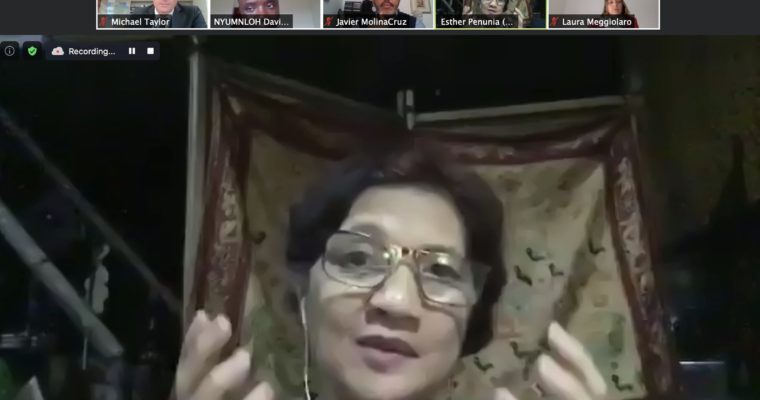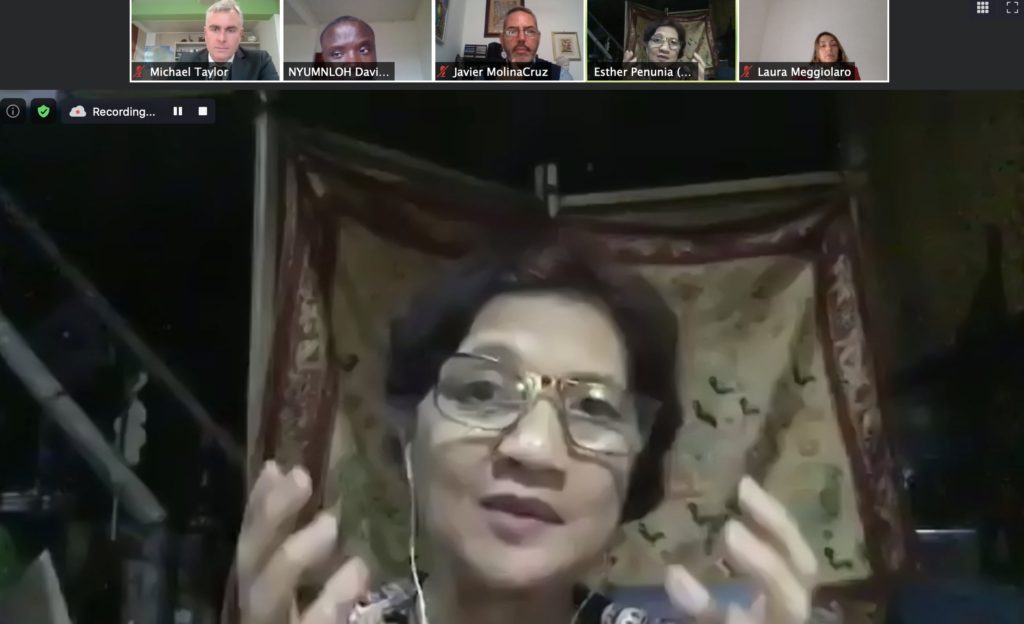Following are the responses of Esther Penunia, AFA Secretary-General, as a panelist in a 1.5-hour webinar entitled “Building Back Better: Confronting the Impact of Covid 19 on Land Tenure, Food Security and Nutrition “, held last October 13, 2020, 10:30-12mn, Manila time, via Zoom. The webinar is one of the partners’ events of the CFS High-Level Special Event on Global Governance of Food Security and Nutrition held from 1-5 October 2020. The webinar was organized by Columbia Center on Sustainable Investment, FAO, Global Donor Platform for Rural Development, International Land Coalition (ILC), IFAD, Land Portal, and Welthungerhilfe. The webinar was moderated by Mike Taylor, Executive Director, of ILC.
Mike: Let me pose the first question to Esther Penunia. What have you seen are the immediate effects of the COVID-19 pandemic on land rights in Asian and for smallholder farmers?
Esther: Thank you, Mike. You are giving me this question at the right time. Because we have just concluded a workshop on Sustaining Family Farming in Asia Pacific, which was part of the Asia Land Forum, convened by ILC, AR Now, AFA, SEI with also IFAD. We know 6 immediate effects based on the exchanges that happened during this workshop.
First, the increased displacement of landless farmers and indigenous communities. Migrant workers from cities domestic or abroad returned to the provinces and their farms. In cases where these returnees are landowners and local elites, they are driving out and displacing tenants and sharecroppers. Ancestral lands are threatened to be further encroached by lowlanders and even by local governments.
Second, additional pressures for land use. If they are part of the farming family, additional members put additional pressures for the land to be more productive, so as to feed more family members. Mobility restrictions have made it difficult for family farmers to access inputs and supply, also limiting areas for planting, and therefore, reducing harvests in the future. In Fiji for example, there are many new farmers because of the returnees, and they need some capacities for technologies on sustainable production.
Third is the suspension or halt of agrarian reform services by the government and CSOs. Because of mobility restrictions and shifting priorities to covid19, activities related to land distribution and land titling to qualified beneficiaries and the corollary agrarian support services have been stopped or slowed down, further threatening the land tenure security of landless farmers. Before the pandemic, we CSOs/FOs can coordinate closely with communities.
Fourth, is with the pastoralists in Mongolia and Kyrgyzstan. Because of travel restrictions, they had to change the route of their pastures, and changing routes was difficult. The covid19 has prevented pastoralists from going to or returning from summer pastures.
Fifth, is the seeming “giving of license” to private companies and industries to come to the territories of local Indigenous Peoples.
And sixth, during the covid 19, several land rights defenders and activities were threatened, arrested, or killed as reported by colleagues in Cambodia, Indonesia, Philippines, sowing fear among people. As democratic assemblies and mass gatherings are prohibited due to social distancing, and as the government enforces compliance to health protocols, the right to peaceful assembly is increasingly curtailed and the call for justice for these killings is ignored.
Back to you, Mike.
Mike: The main focus of this discussion is on how we can build back better to ensure we create resilient and sustainable food systems in the future. Esther, what role do you think land rights play in creating food systems that are more healthy, equitable, and resilient to shocks such as pandemics?
Esther: Thanks for the question, Mike. We emphasize, land rights to a small scale family farmer, both women, and man, young or wise, is basic, is fundamental for a sustainable, healthy, equitable, and resilient food system.
Why? Land is a basic asset for farming.
Without land, where do we plant? If we do not have the rights to the land, we cannot decide on what to produce, how to produce, where to market, where to get loans as we do not have a land title as a collateral for your loan.
We will not invest in making the land productive because after all, as much as 70% of the profit will go to our landowner, despite all our hard work, and we will never know when our landowner will get the land from us. We do not own our land, we do not have the decision over its use, and we will have a very small portion of whatever profits we may get from the use of the land, but we do all the hard work. There is no justice there, right? There is no equity there, right, if we have no rights to the land?
But rights – ownership, stewardship of the land – is just the first step. To have sustainable food production, as a farmer we need to make this land productive. Not only for some years but for many years to come. For the next generation of farmers, our children. Thus, we must have sustainable, climate-resilient, integrated, biodiverse agro ecological systems, whether it be in lowlands, uplands, forests. We must practice sustainable pasture management, sustainable agriculture, sustainable forest management, integrated water resource management. And because our land is part of a whole ecosystem, we must get other farmers in our areas to also do sustainable, climate-resilient agriculture. Because for example, if we want to grow organic corn, but the farmer one kilometer away from our farm sprays pesticide, our organic farm can be affected, the irrigation waters running through our corn farm can get infected.
And then, sustainable food systems is also sustainable processing, packaging, marketing, and distribution. If we own our land, we can put up a processing facility, say a community-based rice mill, or a community-based machine for grating coconut, and do value addition, which can increase the market price of our product and therefore our incomes. We have rights to our lands, we will be free to join cooperatives that will facilitate processing, packaging, and marketing, and distribution of our products. Joining cooperatives facilitate a more equitable distribution of wealth among its members, us.
So for a farmer, land is a great asset, and when the use of the land becomes productive and generates income for the farmer, the children, the youth, will be enticed to farming. We then ensure there will be generation and generation of family farmers who will use their land to produce food that gives health and nutrition, and that is climate resilient, which is friendly to the environment. That is food now, and food for the future.
So Mike, allow me to state our recommendations at this stage. We ask governments to secure rights to land for small scale farmers, pastoralists, herders, forest dwellers, and Indigenous Peoples, and water rights to small scale fishers. Please Apply the Voluntary Guidelines on the Governance of Tenure of Land, Waters, Fisheries, and Forests (VGGT) and the responsible Agricultural Investments (RAI). Please Provide incentives and support for sustainable, climate-resilient, biodiverse, integrated, diversified organic agroecological systems in farms, fisheries, waters, forests, pasturelands. Please Provide incentives and support for sustainable processing, packaging, and marketing, supporting more local food systems and local market hubs. And please recognize the role of family farmers by strengthening multi-stakeholder approaches and mechanisms for agriculture and rural development, making family farmers through our organizations and cooperatives equal partners in the design and implementation of agriculture programs, particularly, with the implementation of the UN Decade of Family Farming, at the national and regional levels. Back to you, Mike.





Comments are closed